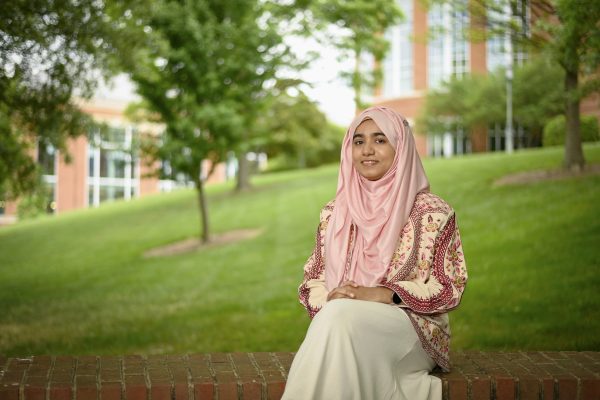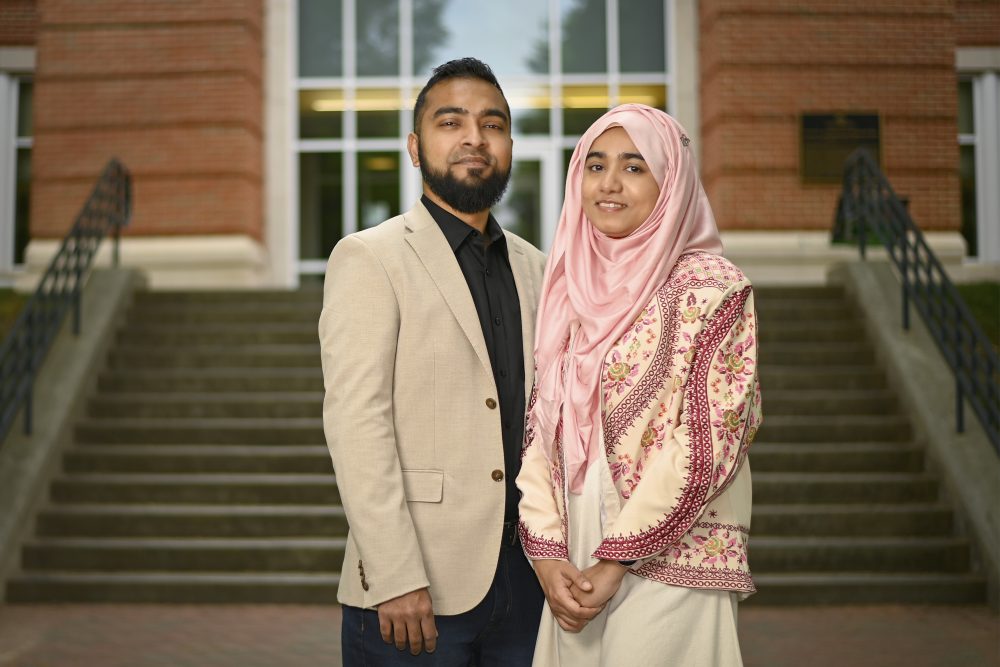Syeda Fatema Mazumder: Paving New Paths in Computer Science Education

Syeda Fatema Mazumder isn’t your average Ph.D. graduate. From moving across the world with her husband Saquib to raising two daughters while completing a rigorous doctoral program in computer science education at UNC Charlotte’s College of Computing Informatics, she’s an inspiring example of what can be accomplished with hard work and the courage instilled by a community of devoted friends, family and mentors.
Born and raised in Bangladesh, Syeda earned her Bachelor’s degree in computer science and engineering from the University of Dhaka. She and Saquib got married after they both finished their undergraduate programs, and she then took her first job as a lecturer at a nearby university. Syeda realized how much she enjoyed teaching, especially delving into the theoretical underpinnings of how students learn and master the complex concepts in computer programming. This experience teaching helped Syeda hone in on her ultimate goal of studying computer science education.
“I realized that learning the skill of programming is not something that happens easily,” she said. “I was interested to see how they were learning: how people actually learn programming, and what the different processes and mental models students used to understand it.”
Syeda and Saquib knew they wanted to study abroad when pursuing their graduate degrees, and were open to a number of countries and programs across the globe to achieve their goals. She wasn’t aware of UNC Charlotte at the time. But eventually, she heard great things from alumni at her alma mater who later attended UNC Charlotte as graduate students. Syeda was further sold on the program by then-CCI Professor Dr. Celine Latulipe, who encouraged her to take the leap of applying to become a Niner doctoral student.
As excited as they were, it was still a daunting proposition. Not only was Charlotte thousands of miles from home, but at that time, Syeda had never left her home country other than to visit neighboring India as a young girl.
On top of that, during her application process, Syeda and Saquib realized that she was pregnant.
Encouraged by Dr. Latulipe — a mother herself and Syeda’s first faculty advisor — she went forward with her application, ultimately arriving in Charlotte in fall 2017 three and a half months into her pregnancy.
“As an international student, I didn’t know what the culture is, how to do academic writing, and didn’t know what shopping I’d need to do for my newborn kid who would be coming soon,” Syeda said. So when her adviser, other CCI professors and her fellow students all got together to throw her a baby shower, providing her with much needed baby supplies, Syeda was elated.
After her daughter was born, Syeda’s CCI colleagues were unwavering in their support. The leaders of her lab held social events where her daughter was welcome to attend with ample toys always available. She also knew she could always turn to the many mothers on CCI’s faculty including Dr. Heather Lipford and Dr. Mary Lou Maher for advice on how to balance raising a young child with the rigors of academia.
“I felt very welcome,” Syeda said. “I felt surrounded by people who also went through the same situation as I was, and I saw many women in front of me in leadership positions like Dr. Maher, Dr. Latulipe, and Dr. Lipford. It made me feel like what I was doing really was possible.”
Syeda’s family received invaluable support from her fellow international students and the school’s Bangladeshi community. Friends set up a meal train to deliver food after her first daughter’s birth, and provided rides to campus, to doctor’s appointments and to the grocery store before Syeda and Saquib were able to buy a car. Syeda’s friends from the Bangladeshi community would help babysit — free of charge.

Saquib supported their family for about a year as a stay-at-home dad when they first arrived in Charlotte. He eventually became a CCI student as well in the software and information systems Ph.D. program. The couple welcomed their second daughter to their family in 2022 when their first daughter had just entered Pre-K. Syeda’s mother even visited Charlotte twice to take care of both girls as newborns so that Syeda could continue to make progress on her dissertation.
When Latulipe accepted a new job opportunity at the University of Manitoba in 2019, Syeda was in need of a new Ph.D. adviser within CCI. She turned to Professor of Software and Information Systems Dr. Manuel Pérez-Quiñones, whose pioneering work in computer science education research was a perfect match for her interests. Alongside Dr. Pérez-Quiñones, Syeda worked to develop new models to explain the processes through which students learn computer programming skills and suggest educational interventions to help them improve the mental models they use to conceptualize programming to make the learning process easier. This became the topic of her dissertation, which she successfully defended in spring 2024.
“His relentless support and guidance is what enabled me to make this possible,” Syeda said.
During her time as a graduate student, Syeda made it a priority to support other international students as she’d been supported by help from the University’s Bangladeshi Student Organization. Over the years, Syeda became an invaluable resource herself to fellow Bangladeshi graduate students, especially those who were also starting families during their time at UNC Charlotte.
After completing her Ph.D., Syeda took a well-deserved break. She enjoyed spending plenty of quality time with her young daughters, now six and one, playing with them at home with Saquib and going on family bike rides up and down the trails surrounding the University. This fall, she began putting her expertise in computer science education into practice by becoming a computer science and mathematics instructor at Johnson C. Smith University, supporting the school’s STEAM Learning Center.
Her advice to other aspiring international students is simple: take the leap, pursue your educational passions, and to never be afraid to reach out to your fellow students who’ve been through similar experiences.
“It’s important to build community,” Syeda said. “If you can share your perspective with your fellow students, or talk about your situation or your personal challenges, they can help you to make your journey more comfortable and more delightful.
“If you don’t reach out, you won’t be able to find that community,” she continued. “So we need to encourage them to try and step out first.”